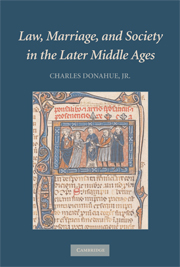Book contents
- Frontmatter
- Contents
- List of Tables
- List of Appendices
- Preface
- Acknowledgments
- Notes About This Book
- Introduction
- 1 The Background Rules and Institutions
- 2 Lying Witnesses and Social Reality: Four English Marriage Cases in the High Middle Ages
- 3 Statistics: The Court of York, 1300–1500
- 4 Story-Patterns in the Court of York in the Fourteenth Century
- 5 Story-Patterns in the Court of York in the Fifteenth Century
- 6 Ely
- 7 Paris
- 8 Cambrai and Brussels: The Courts and the Numbers
- 9 Cambrai and Brussels: The Content of the Sentences
- 10 Divorce a mensa et thoro and salvo iure thori (Separation)
- 11 Social Practice, Formal Rule, and the Medieval Canon Law of Incest
- 12 Broader Comparisons
- Epilogue and Conclusion
- Bibliography and Abbreviations
- Subject Index
- Texts and Commentary
- Table of Cases
- Table of Authorities
- Index of Persons and Places
9 - Cambrai and Brussels: The Content of the Sentences
Published online by Cambridge University Press: 14 July 2009
- Frontmatter
- Contents
- List of Tables
- List of Appendices
- Preface
- Acknowledgments
- Notes About This Book
- Introduction
- 1 The Background Rules and Institutions
- 2 Lying Witnesses and Social Reality: Four English Marriage Cases in the High Middle Ages
- 3 Statistics: The Court of York, 1300–1500
- 4 Story-Patterns in the Court of York in the Fourteenth Century
- 5 Story-Patterns in the Court of York in the Fifteenth Century
- 6 Ely
- 7 Paris
- 8 Cambrai and Brussels: The Courts and the Numbers
- 9 Cambrai and Brussels: The Content of the Sentences
- 10 Divorce a mensa et thoro and salvo iure thori (Separation)
- 11 Social Practice, Formal Rule, and the Medieval Canon Law of Incest
- 12 Broader Comparisons
- Epilogue and Conclusion
- Bibliography and Abbreviations
- Subject Index
- Texts and Commentary
- Table of Cases
- Table of Authorities
- Index of Persons and Places
Summary
The numbers that we explored in the preceding chapter left us with several questions. There were differences between Cambrai and Brussels that were hard to account for on the basis of our speculations about differing roles of the secular and the lower ecclesiastical courts. Prominent among these was the greater involvement of the promotor in spousals cases at Brussels and the greater involvement of the promotor in separation and divorce cases at Cambrai. Underlying this difference was a difference between the courts of Cambrai diocese and that of other ecclesiastical courts that we have examined: the far greater role of the promotor generally. We sought, without success on a priori grounds, to sort out the motivations of the promotors and the parties, some of whom joined with the promotor and some of whom did not. Because of the formulaic nature of the only record we have, the sentences, we may not be able to penetrate as deeply into what is happening in matrimonial litigation in Cambrai diocese as we were in York, Ely, and Paris, but the sentences themselves do tell us something, and it is to these that we now turn.
TWO-PARTY SPOUSALS CASES NOT ALLEGING COPULA
Contested – Cambrai
As Tables 8.7 and 8.8 show, there are in our sample of Cambrai cases 70 two-party spousals cases where copula was not alleged.
- Type
- Chapter
- Information
- Law, Marriage, and Society in the Later Middle AgesArguments about Marriage in Five Courts, pp. 424 - 520Publisher: Cambridge University PressPrint publication year: 2008



